'I've always hated waiting and now that's all I do'
As part of our comprehensive coverage of the refugee crisis, AFP reporters are following a handful of refugees at different stages of their journeys toward Europe. You can read about the young Iraqi couple waiting on asylum in The Netherlands here.
This is a story of Moufid, a restaurant owner from the Syrian city of Aleppo, who is waiting for a new beginning in Greece.
ATHENS - After the war in Syria destroyed the four restaurants he owned in Aleppo, Moufid left for Greece, like 1.15 million people have done this year. He was hoping to reach Germany, where he lived for a bit as a youngster, and where he has some family.
He got to Greece in May, two months after an EU-Turkey agreement entered into force, confining asylum seekers to remain on the Greek islands on which they arrived and calling for their systematic return to Turkey.
Moufid however managed to get to Athens, where he asked for asylum, hoping to get a residency permit and travel documents that would allow him to visit his family in Germany. That is, if he doesn’t decide to remain in Greece. He asylum application was approved and now he is waiting to receive the travel documents.
As he waits, the 60-something passes his days in Athens’ Omonia Square, where he goes from cafe to cafe drinking coffee (he averages eight cups each day). Omonia has become THE place for asylum seekers to meet.
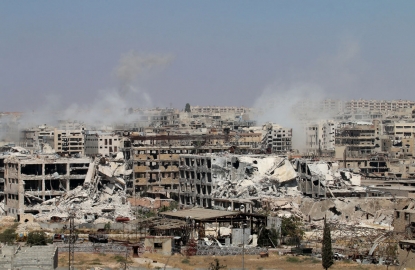 Aleppo, July, 2016. (AFP / George Ourfalian)
Aleppo, July, 2016. (AFP / George Ourfalian)I held out in Aleppo for five years, but finally left in January. First I went to Beirut, to my eldest son’s house, then I spent four months at my daughter’s house in Mersin, in Turkey. I thought about staying, but I don’t like Turkey’s politics.
In May, I paid Turkish smugglers to allow me onto a rubber dinghy with several dozen other people. We arrived on the island of Chios in the middle of the night. We were met by police, who escorted us to a transit camp. But there, they told us that there was no room and that we had to come back in the morning to register.
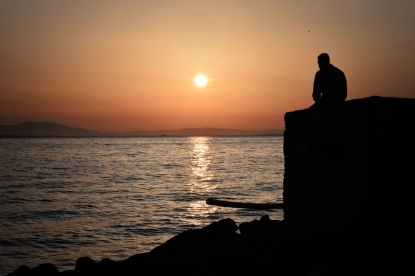 Chios, April, 2016. (AFP / Louisa Gouliamaki)
Chios, April, 2016. (AFP / Louisa Gouliamaki)I took a taxi to a small hotel, where I spent six days. I then managed to get to Athens. I'm not alone -- lots of people have done so since the EU-Turkey deal has come into force.
I live in a hotel on Omonia Square. It’s simple, but clean. I pay 400 euros a month.
Smugglers have offered to take me to Germany for 5,000 euros. You give them the money and they give you passports and air tickets. The cost covers all the times that it may take you to actually leave the country. Sometimes it takes three or four times before you manage to leave. I don’t know how they do it. They seem very professional.
But 5,000 euros is a lot of money. Instead I bought a Spanish ID card, which cost only 350 euros. What do you think, do I look like the photo on the card? If I put glasses on my head like this, it hides the fact that I have a bit less hair than the guy in the picture, no?
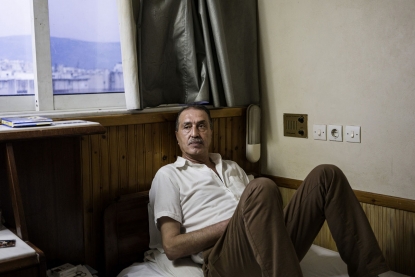 Moufid in his hotel room in Athens. (AFP / Angelos Tzortzinis)
Moufid in his hotel room in Athens. (AFP / Angelos Tzortzinis)Everyone here knows that you don’t risk much by using false papers. The worst that will happen is that police will stop you at the airport and will send you back to Athens, telling you not to do it again. But of course you do it again, until it works…
I have taken the train up to Thessaloniki, to see how the airport security is. I just can’t seem to decide whether to go or not. I am afraid of the moment that I will be detained. The fear has become my best friend. So I remain here, I don’t even really know why.
Weeks, weeks, months, months. I have always hated waiting and now that’s all I do.
I have travelled so often between Syria and Europe in my life. I lived in Europe for 13 years, nine of them in Germany. I’ve lived in Turkey, Egypt, Lebanon, rarely more than two years in the same place.
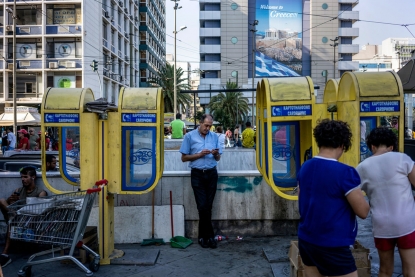 Moufid at Athens' Omonia Square. (AFP / Angelos Tzortzinis)
Moufid at Athens' Omonia Square. (AFP / Angelos Tzortzinis)I have four kids -- my 39-year-old son who was born in Berlin and lives in Beirut, my daughter who lives in Turkey, a 20-year-old son who didn’t want to leave Aleppo and is still there, and a 15-year-old daughter who is in Germany with her mother. For my kids I’m God on earth. But what happens when God has problems?
I decided to ask for asylum in Greece. To make a new start. Everyone told me it was risky to ask for asylum in Greece, since I got here after the EU-Turkey deal went into effect and I wasn’t registered. I didn’t really know what I would tell them.
Since I am Syrian and have a passport and asked for asylum in Greece -- instead of asking to go on to another European country -- I got my asylum interview in three weeks.
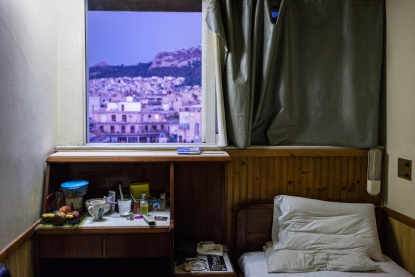 Room with a view. (AFP / Angelos Tzortzinis)
Room with a view. (AFP / Angelos Tzortzinis)I arrived for it at seven o’clock in the morning. The whole night before, I talked to myself, preparing for what I was going to say, telling myself to be careful. In the end, I just told them the truth.
We communicated through an Arabic interpreter. The interviewing agent asked me “Why Greece?” I answered, “Why not?” She asked me, “You’re 100 percent sure you want to stay here?” I said, “110 percent sure.”
I told them that I travelled from Syria to Beirut, Turkey and Greece. I didn’t mention Chios or provide any other details and they didn’t ask. They asked me about armed groups and the government in Syria. I told them that I had nothing to do with either. They asked me if I had kids, if I was Christian or Muslim. I told them I was a Sunni Muslim.
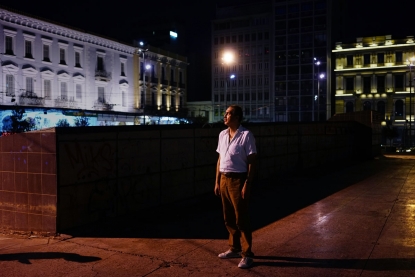 (AFP / Angelos Tzortzinis)
(AFP / Angelos Tzortzinis)Everything I told them was the truth. But I didn’t go into details. And they only asked me a handful of questions, no more than eight. Then I waited a bit in the corridor. Then the woman came out, smiling. She told me ‘Congratulations,’ that I was being given refugee status, that I would be given three-year residency papers and travel documents that would allow me to travel throughout Europe.
I don’t know why it went so fast. People I know don’t know why either. Why me? Why am I so special? They wrote on the paper that I was afraid of having problems in Syria because of my religion… I don’t remember saying that.
They also gave me a number. They told me that in five or six weeks, the number would appear on the Greek asylum website and that I could then come to get my residency permit. And after that, my travel documents. With these, maybe I’ll still try to move to Germany or the Netherlands. If that doesn’t work, then I’ll settle here, and do business in this country. Either restaurants or maybe import-export. We’ll see.
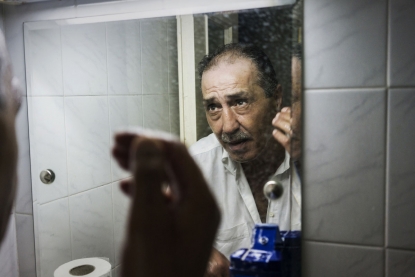 (AFP / Angelos Tzortzinis)
(AFP / Angelos Tzortzinis)I teach German to the refugee kids. Kids can drive you crazy in a hurry. ‘Sit, don’t move, listen to me.’ But I like helping them.
With the temporary asylum seeker’s card that I have, I could ask for help from NGOs. but I’m not a woman, I’m not sick, I am ashamed to ask for their help.
I’m going to leave the hotel soon, I found a bigger room, cheaper, in an apartment 10 minutes from Omonia. It’s rented by a Polish woman, who rents a few of them like this. 200 euros a month, including electricity.
It’s not exactly what I want, but I just want a place for myself. Somewhere where I can make my own coffee, my own food, have my life, sleep and wake up when I want.
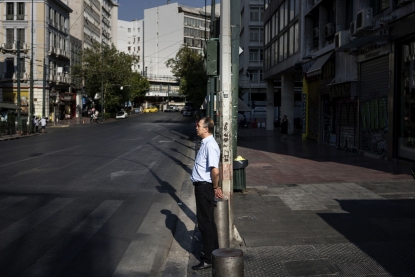 (AFP / Angelos Tzortzinis)
(AFP / Angelos Tzortzinis)To pass the time, I watch football and the Olympic Games. When you watch sports, it’s not that bad to have Greek commentators.
I’ve become friendly with another Syrian man. He called me the other day to see if I wanted to travel a bit in Greece with him. I told him ‘you’re here to ask for asylum or to play tourist?’
I spend my days at the square. From 11 o’clock in the morning to around 3 o’clock at night. I drink coffee and smoke two to three packs of cigarettes. Everyone around here knows that I only drink coffee, without sugar. I eat once a day, around 5 or 6 o’clock in the afternoon. Simple things -- bread with cheese, fruit. I don’t like to sit for too long and I don’t really get hungry.
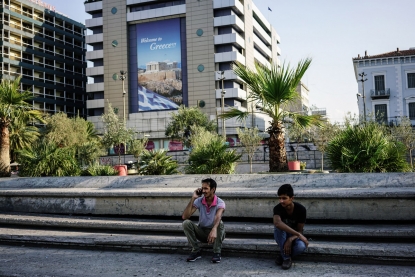 Omonia Square, Athens. (AFP / Angelos Tzortzinis)
Omonia Square, Athens. (AFP / Angelos Tzortzinis)If you spend all day here, you see how many people need help. I speak to a lot of people. They all have someone somewhere. In France, in Germany. And they, they are here. 90 percent of Syrians with whom I speak are ready to pay not to remain here.
If it was a little better in Syria, I’d return there tomorrow. But I think that we’ll have to wait 10 years before it gets better there.
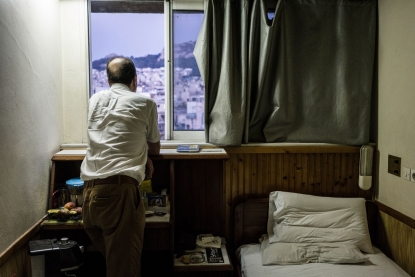 (AFP / Angelos Tzortzinis)
(AFP / Angelos Tzortzinis)I’ve seen Syrians who have registered on the islands of arrival like they were supposed to and who have gotten asylum.
And over the past few weeks, I’ve noticed something new -- Syrians who have gotten asylum in Germany and The Netherlands, but who want to return to Turkey because they didn’t like it in those countries. They return to Athens, try to sell their refugee papers, and then go to northern Greece to try and cross into Turkey, since they can’t enter the country without a visa.
See that boy over there, in a black T-shirt? He’s Iraqi and he bought papers like that yesterday for 500 euros, I think. It’s incredible to fight so hard to get refugee papers and then to just sell them like that, for so little…
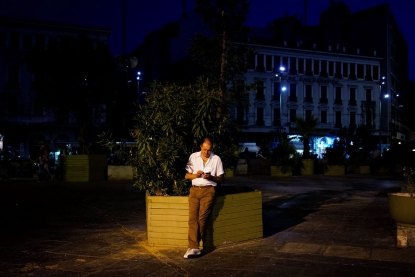 (AFP / Angelos Tzortzinis)
(AFP / Angelos Tzortzinis)According to the Greek government, there are currently 57,000 migrants and refugees in the country. A bit over 47,000 are in camps, squats or hotels like Moufid in continental Greece. Most of them arrived after the closure of the border in northern Greece in February, trapped in a country that they thought they would just pass through on their way to northern Europe.
Many of those eligible (mostly Syrians and Iraqis), have enrolled in a relocalization program, which gives them a chance of obtaining asylum in another EU country. But only 2,735 have been granted such asylum as of late July.
The other 10,000 are stuck on the islands where they landed, because of the EU-Turkey plan. But it hasn’t worked as intended. Most of these people have asked for asylum in Greece, to gain time and to avoid being sent back to Turkey. As of July 21, only 468 have been sent back.
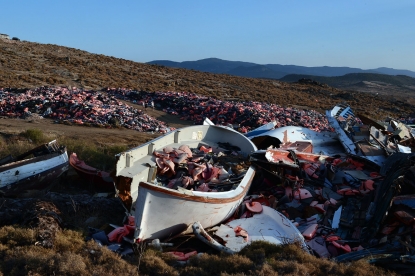 Boats and life jackets abandoned by asylum seekers on Lesbos, July, 2016.
(AFP / Louisa Gouliamaki)
Boats and life jackets abandoned by asylum seekers on Lesbos, July, 2016.
(AFP / Louisa Gouliamaki)



